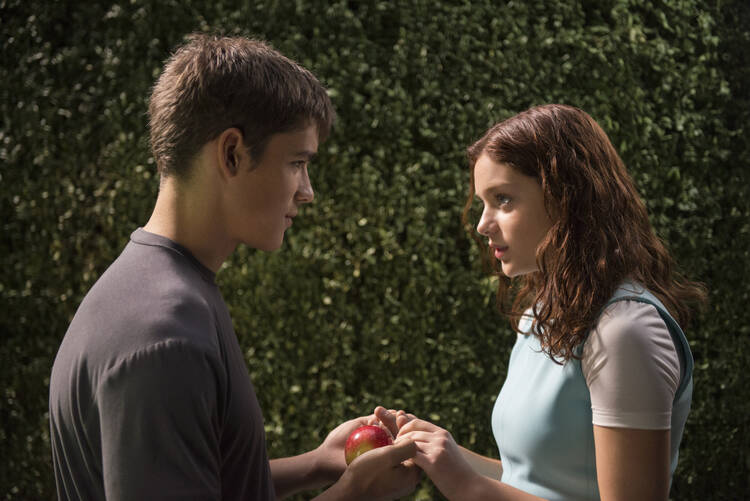My memories of reading The Giver in middle school are vivid, although not because of any particular effect the novel had on me. Lois Lowry’s 1993 novel has a famously ambiguous ending, and our assignment in 7th grade was to write a satisfying conclusion and share it with the class. Ms. Butler—who was as close as a woman can get to being a nun without actually putting on a habit—listened to each piece in turn, making notes as we progressed down the class roster in alphabetical order. And everything was going well, until it was Robert’s turn.
Evidently Robert had begun puberty a little earlier than the rest of us, because his final chapter featured a scene in which two beautiful women beg Jonas, the main character, to strip naked before entering their village. Needless to say, he wasn’t allowed to finish, although rumor had it he received a C- for his efforts.
With his film adaptation, Philip Noyce seems to be moving in the same direction as Robert: make everything louder and sexier; raise the stakes. The film follows the same outline as a novel—young Jonas (Brenton Thwaites), growing up in a polished utopian community, is selected to be the Receiver of Memory, a job that awakens him to everything missing in his sanitized world—but fails to hit the same emotional notes. Banking on the reliability of the Hunger Games/Divergent trend, Noyce fills this world with the cold chrome we’ve come to expect in dystopian films.
Upon entering adulthood and receiving his job, Jonas begins training with the Giver (Jeff Bridges), a man who, like Jonas, has the ability to “see beyond” and uses his natural talents to absorb and contain memories of the human experience before the calm perfection enforced by the Community. Now, he will pass on those memories to Jonas. As he realizes the sinister truth behind his perfect life, Jonas becomes a lone force in the face of a Community that, in the film, serves as a relentless enemy, complete with a military force. To my 12-year-old self, one of the great strengths of the novel was its subtlety. In the film, instead of gradually revealing the horror behind the perfection, Noyce makes it clear that the Community leaders are bad guys. Compared to the Jonas of the book, who is only 12, in the film Jonas is much older and seems lackluster, stumbling around while the audience waits for him to figure things out. In one memorable scene, Jonas confronts pain when he experiences the memory of an elephant being shot to death by poachers. One can’t help but feel bad for the kid; if the death of an elephant traumatizes him that much, he’s in for a rough awakening when he realizes just how violent the world can be.
There was a reason I was assigned the book in Catholic school. Both the movie and the novel grapple with the same problems as the church: the dignity of life, the question of how a community should function and the difficultly of navigating a world influenced by sin. Jonas’s forays into the depths of human love and cruelty are accompanied by a recurring motif of an apple, calling to mind the Garden of Eden. We’re presented with an inevitable progression. When society begins to prioritize technologically advanced perfection, it’s a slippery slope. Family relationships have broken down to the point where Jonas’s own mother (Katie Holmes) explains that “love” has become “a word so antiquated it has no meaning in our society.”
This is a world without respect for the soul.
It’s simplistic to reduce the narrative to a morality play, one that advocates the embrace of the world as a whole, in all its good and bad. Unfortunately, that’s exactly what Noyce does when he ages the characters up, makes the movie an action flick and changes the ambiguity of the ending.
In a similar vein, some reviewers of “The Hunger Games” movie have been bright enough to point out the ironic relationship between the film and the audience—if the conceit of the film is that the bloodthirsty citizens of the Capitol are content to watch children slaughter each other, what does it mean when we line up to see a film about children slaughtering each other? “The Giver” raises similar questions; the film is a critique of a sleek, emotionless society, in which perfection is valued above the messiness of humanity. So what does it mean when we sit down to watch that film and it’s also sanitized, sleek and stripped of nuance? Ultimately, the filmmakers and the Community have the same idea of perfection.
It’s a common complaint lately that all teen movies are the same. There’s a young protagonist who is somehow different from everyone else. There’s a menacing, futuristic enemy with an iron fist grip on society. There’s a tortured love interest. No matter the worthiness of the source material, there’s a formula that sells, a formula that we as consumers appreciate at some level for its reliability. The future presented in “The Giver” is just an extension of this search for pleasing regularity. Jonas battles against the urge to make everything generic, perfect and beautiful, but that is exactly what Noyce does to the novel.
But if Noyce ever goes looking for a screenwriter to collaborate with, I know a guy I can recommend. His name is Robert.








